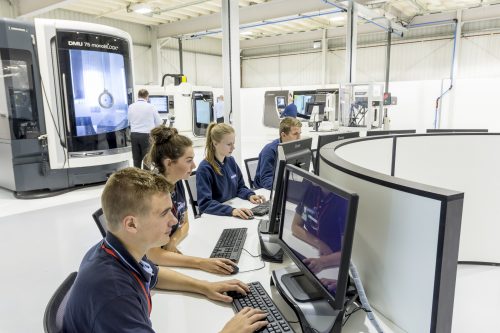Taking a technical approach to training in region

Speaking last December education secretary Damian Hinds set out his 10-year ambition to upgrade the nations’ skills.
Technical and vocational education stood at the heart of the plan, he declared.
The aim is to ensure young people in the UK have the same high-quality training opportunities, with “clear pathways” to skilled jobs, as those in top performing technical education countries like Germany.
He warned Britain must drop its ‘snobby’ attitude to technical and vocational education.
And pulling no punches he added: “As a nation I’m afraid we’ve been technical education snobs. We’ve revered the academic but treated vocational as second class – when we do it well, law, engineering, medicine – then we don’t even call it vocational.”
In recent times the focus has been on apprenticeships, following government reforms that looked to shift the focus towards meeting employers’ needs, improve quality, and make the programme more employer-funded.
At the heart of those reforms has been the Apprenticeship Levy. Requiring businesses with an annual pay-bill of more than £3m to pay into a central fund, the levy was designed to increase investment in apprenticeship training and assessment.
According to guidelines from the Department for Education, an employer paying £10,000 a month into their levy account would receive that £10,000 back to spend on apprenticeships, plus a 10 per cent contribution from the government.
However there have been concerns that the reforms are not delivering all they should be.
The Department for Education has “some way to go” before it can demonstrate that the apprenticeships programme is achieving value for money, with numbers of apprenticeships below pre-reform levels, according to the National Audit Office (NAO) in March.
The take-up of levy funds is below what the department expected. In 2017-18, levy-paying employers used nine per cent of the funds available to them to support new apprenticeships, equating to £170m of almost £2.2bn available.
Partly because of this, the Department spent less on the programme than it budgeted. In 2017-18, it spent £1.6bn, which was £0.4bn less than budgeted, according to the NAO.
Apprenticeships also now cover a wide range of professions and types of training – such as accountants, actuaries and solicitors – raising questions about whether public money is being used to pay for training that already existed in other forms.
Amyas Morse, head of the NAO, said: “Despite making changes to the apprenticeships programme, the Department has not enticed employers to use available funds or encouraged enough potential recruits to start an apprenticeship. It has much more to do to meet its ambitions.
“If the Department is serious about boosting the country’s productivity, it needs to set out clearly whether its efforts are on track to meet that aim.”
Verity Davidge, head of education and skills at Make UK (formerly EEF), said: “The report confirms what industry already knows; the apprenticeship levy is not working.
“Manufacturers have always been true champions of apprenticeships but the government’s reforms have left many deeply frustrated.
“With one in ten manufacturers actively delaying or cancelling apprenticeships because of the levy and 95 per cent saying the Apprenticeship Levy must be changed it’s no wonder that starts have taken a nose dive.
“While the move towards higher level apprenticeships should be applauded, we cannot ignore the fact that manufacturers need a pipeline of trained staff from shop floor to top floor.”
“Government needs to stop tweaking around the edges and use its current review to really listen to employers and make radical change and make it quickly.”

Chancellor Philip Hammond, ahead of the 2019 Spring Statement
Chancellor Philip Hammond has moved to address some of the concerns. In his Spring Statement he revealed the 10-per-cent fee that small businesses must pay when they take on apprentices will be halved from April.
The contribution that non-levy paying companies pay towards apprenticeship training will fall to five per cent.
Levy paying employers will also be able to share more funds across their supply chains, with the maximum figure going up from 10 per cent to 25 per cent in a bid to increase flexibility
Apprentices are key to having competitive edge
Apprentices and the companies who employ and train them are key to the UK maintaining a competitive edge in the global marketplace, says Neil Garritty.
The operations director at technical plastics specialist MGS Technical Plastics is in no doubt of the important role they continue to play in the skills agenda.
He declares: “Apprenticeships are absolutely critical to the future of the engineering industry and the UK’s competitiveness in international markets.”
The business, based in Blackburn, has recruited six new apprentices over the last 18 months, accounting for more than 10 per cent of its total workforce.
In addition, all of the company’s directors began their careers on apprenticeship programmes.
Mr Garrity says: “The programme allows firms like ours to shape the next generation of workers in terms of skills and attitudes, while the apprentices earn a professional qualification while benefiting from on-the-job, hands-on training.”
However, he is concerned that many businesses don’t fully understand the potential of such schemes, with numbers of apprenticeship opportunities falling in recent years.
He said: “Employing apprentices has been fantastic for our business. I think some of our peers worry that an individual may walk away once they have completed their training. But despite this small risk, our apprenticeship programme has paid for itself ten times over.
“Employers who choose not to invest in apprentices are being left behind. They struggle to source the skills they need.”
John Kerr, operations director of Develop Training Limited (DTL), a provider to the utilities and construction sector with an operation in Bolton, says apprenticeships can also generate social mobility.
He adds: “Instead of racking up student debt, apprentices earn while they learn, and apprenticeships provide other ways of learning for those who aren’t suited to academia.
“Yes, there is an element of classroom learning but for most of our apprenticeships, the focus is on learning through well-supervised, genuine on-the-job experience.”









